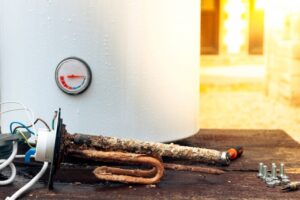When you imagine a plumbing emergency, chances are, you’re thinking about a frozen, burst pipe, perhaps spraying water that immediately turns into icicles. And it’s true that this is a reasonable concern in our climate (except for perhaps the icicles). But sometimes, a plumbing emergency actually has to do with your water heater.
If you’re like most people, you don’t think about your water heater much, unless you suddenly find yourself taking a cold shower. But that means you might not be taking the precautions that could prevent problems. What kind of emergencies can water heaters have? What can be done to prevent them? We’ve got some helpful information for you.
Corrosion
Corrosion is the leading cause of death for water heaters. Once rust sets in on the tank itself, there’s nothing that can be done to repair it. A patch wouldn’t hold because water heaters have to deal with high temperatures and a lot of water pressure. If you don’t replace your rusting water heater, eventually, it will spring a leak. That might be a small and gradual leak, but it might be dramatic and sudden.
How can corrosion be prevented in your water heater? It has a component called the anode rod which will sacrifice itself, corroding before the rest of the system. (It also has the function of making the tank an unfriendly environment for bacteria.) If you have the anode rod replaced before it is completely corroded, you’ll be able to protect the tank.
Sediment
As clean as your water looks, it does contain a little bit of sediment. Once thousands of gallons of water have passed through your water heater, a lot of sediment may have settled out of that water and into the bottom of the tank. This can cause heat to be trapped under the sediment, so that a pocket of extremely hot water develops, raising the pressure and risking a leak.
Pressure
The hotter the water, the higher the pressure. And if that pressure gets too high, the tank can simply explode! This is, thankfully, a very rare occurrence, but you should know how to prevent it so that you won’t be dealing with this extremely dangerous water heater emergency in Cambridge, MA. Never let the water temperature get above 140. In fact, 120 or 125 should be all the heat you need.
Maintenance
All of these problems can be avoided with annual water heater maintenance. Your plumber can replace the anode rod before corrosion spreads to the rest of the water heater. They can flush sediment out of the system. And they can test your water temperature and pressure to ensure it’s at safe levels and the hydrostat is properly calibrated.
Don’t let water heater emergencies happen to you! Keep yourself and your home safe from explosions, leaks, and water damage, and ensure that your water heater will keep your showers warm for as many years as possible. Schedule maintenance today.
Reach out to Cooling Unlimited, Inc. to speak with qualified water heater experts.


